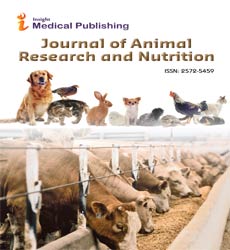Animal Welfare in Agricultural Practices and itâÂÂs Impact on the Veterinary Sector
Giuseppe Alzerwi*
Department of Livestock Production, Njala University, Njala, Sierra Leone
Giuseppe Alzerwi*
1Department of Livestock Production, Njala University, Njala, Sierra Leone
- *Corresponding Author:
- Giuseppe Alzerwi,
Department of Livestock Production, Njala University, Njala, Sierra Leone
E-mail: azerwi_g@gmail.com
Received date: September 18, 2024, Manuscript No. IPJARN-24-19742; Editor assigned date: September 20, 2024, PreQC No. IPJARN-24-19742 (PQ); Reviewed date: October 04, 2024, QC No. IPJARN-24-19742; Revised date: October 11, 2024, Manuscript No. IPJARN-24-19742 (R); Published date: October 18, 2024, DOI: 10.36648/2572-5459.9.5.138
Citation: Alzerwi G (2024) Animal Welfare in Agricultural Practices and it’s Impact on the Veterinary Sector. J Anim Res Nutr Vol.9 No.5: 138.
Description
Animal welfare has become a subject of growing global interest, transcending the boundaries of science, ethics and policy. It concerns the physical and psychological well-being of animals and is closely linked to how we use animals in agriculture, research, entertainment and companionship. Ensuring animal welfare is an ethical duty that reflects the evolving societal values about the treatment of animals, but it is also riddled with complexities. This commentary discusses the multifaceted nature of animal welfare, exploring its scientific basis, ethical considerations and challenges in various contexts, particularly in agriculture and research.
Animal welfare
Animal welfare is underpinned by the principle that animals, as sentient beings, are capable of experiencing pain, pleasure and emotions and therefore deserve moral consideration. The concept of sentience is central to this debate, acknowledging that animals have the capacity for subjective experiences, including suffering. The ethical theories surrounding animal welfare generally fall into two broad categories: Utilitarianism and rights-based approaches. The utilitarian perspective, advocated by philosophers such as peter singer, suggests that the welfare of animals should be weighed alongside the benefits of their use by humans.
While these theories provide frameworks for discussing animal welfare, the application of ethical principles varies across societies, influenced by cultural, religious and economic factors. In some countries, animal rights are enshrined in law, while in others, animals are viewed primarily as resources for food, labor or entertainment. These principles have become the foundation for animal welfare standards in agriculture, research and zoos. However, implementing them is far from straightforward. While these freedoms represent the ideal, achieving them in practice often involves a compromise between the animal's well-being and the practical constraints of intensive farming, biomedical research or other human uses of animals.
Animal welfare in agriculture
Intensive animal farming in agricultural practices poses significant challenges to animal welfare. In modern industrial agriculture, animals like chickens, pigs and cows are often confined to cramped spaces with limited opportunities for natural behaviors. These restrictive living conditions, which include overcrowding and poor bedding and ventilation, contribute to various welfare issues. Animals in such environments experience increased stress, heightened risk of injury and a greater susceptibility to disease. The lack of space and social interaction, combined with inadequate environmental conditions, severely impact their physical and mental well-being. Addressing these issues requires a shift towards more humane farming practices that prioritize the animals' needs for space, social engagement and proper care.
Efforts to improve animal welfare in agriculture often focus on the development of more humane practices, such as cage-free systems for laying hens, enriched environments for pigs or pasture-based systems for dairy cattle. While these systems are often more costly, they are increasingly demanded by consumers who are becoming more conscious of animal welfare. The rise of organic and free-range labels reflects a growing awareness and demand for higher welfare standards in food production. However, there is ongoing debate about the effectiveness of these labels. Technological advancements are also influencing animal welfare in agriculture. Precision livestock farming, for instance, uses sensors and data analysis to monitor animal health and well-being, allowing farmers to identify and address welfare issues more proactively. However, even with these advancements, balancing welfare with the economic pressures of production remains a significant challenge.

Open Access Journals
- Aquaculture & Veterinary Science
- Chemistry & Chemical Sciences
- Clinical Sciences
- Engineering
- General Science
- Genetics & Molecular Biology
- Health Care & Nursing
- Immunology & Microbiology
- Materials Science
- Mathematics & Physics
- Medical Sciences
- Neurology & Psychiatry
- Oncology & Cancer Science
- Pharmaceutical Sciences
